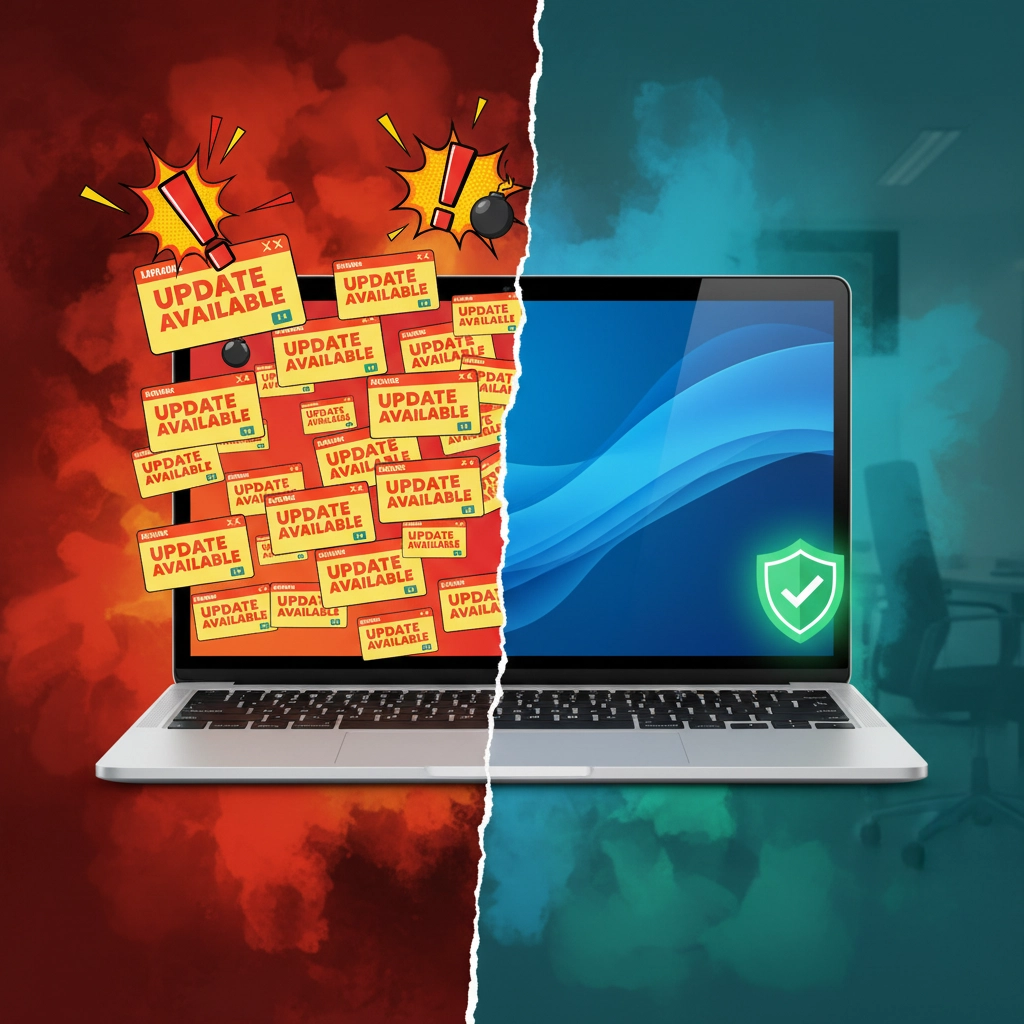
Are You Making These Common Cybersecurity Mistakes? Why 50% of Cyber Attacks Target Small Businesses
0
0
0
Running a small business is challenging enough without worrying about cyber criminals lurking around every digital corner. But here's a sobering reality check: 50% of all cyber attacks target small businesses. That's right, half of all cyber attacks aren't aimed at massive corporations with billion-dollar revenues, but at businesses just like yours.
Why does this matter to you? Because if you're thinking "we're too small to be a target," you're making the first, and potentially most dangerous, cybersecurity mistake on our list.
Why Cybercriminals Love Small Businesses
Let's get straight to the point: small businesses have become the preferred hunting ground for cyber criminals, and it's not personal, it's purely strategic. Think of it like this: if you were a burglar, would you target the house with multiple security cameras, alarm systems, and guard dogs, or the one with an unlocked front door?
Small businesses typically invest less than £400 annually in cybersecurity, making them significantly easier targets than large enterprises with dedicated IT security teams and million-pound budgets. The statistics are eye-opening: 61% of small and medium businesses were targeted by cyberattacks in 2021, and 71% of all cyberattacks occur at businesses with fewer than 100 employees.
Here's what makes small businesses particularly attractive to cybercriminals:
Limited security budgets: Most small businesses prioritise immediate operational needs over cybersecurity
Fewer security layers: Unlike large corporations, small businesses often lack multiple defensive measures
Less scrutiny: Attacks on small businesses receive less media attention and law enforcement focus
Human factor: Smaller teams mean fewer people to spot suspicious activity
Gateway access: Small businesses often work with larger companies, providing a backdoor into bigger targets

The Most Dangerous Cybersecurity Mistakes (And You're Probably Making At Least One)
Mistake #1: Treating Passwords Like Suggestions
We've all been there, using "password123" or your company name followed by the year. It feels harmless when you're rushing to set up a new account, but here's the reality: people reuse passwords 64% of the time, creating a domino effect where one compromised account can topple your entire business.
Imagine Sarah, who runs a small marketing agency. She used the same password for her business email, banking, and client management system. When cybercriminals cracked her email password through a data breach at an unrelated website, they suddenly had access to everything. One password. Complete business compromise.
The fix: Create unique, complex passwords for every single account. Use a password manager like Bitwarden or 1Password, they're affordable (often under £3 per month) and will generate and store strong passwords for you. Enable two-factor authentication wherever possible. Yes, it adds an extra step, but it's like adding a deadbolt to that unlocked door.
Mistake #2: Ignoring Those Annoying Update Notifications
"Update available": click "Remind me later." Sound familiar? We get it. Updates are inconvenient, they interrupt your workflow, and sometimes they change things you've grown comfortable with. But here's what's happening when you delay: cybercriminals are actively scanning for businesses running outdated software with known vulnerabilities.
Think of software updates like fixing a broken lock on your office door. You might postpone it because it's inconvenient, but every day you wait is another day someone can walk right in.
The fix: Set up automatic updates for your operating systems, web browsers, and critical software. Schedule them for evenings or weekends when they won't disrupt business operations. For critical systems that can't auto-update, create a monthly calendar reminder to check for and install updates manually.

Mistake #3: Assuming Your Team Knows What They're Doing
Your employees are brilliant at their jobs: but that doesn't mean they can spot a sophisticated phishing email or recognise social engineering tactics. Without proper training, your most valuable team members can unintentionally become your biggest security risk.
Consider Tom's story. He owns a small accounting firm, and one of his trusted employees received an email that appeared to be from their bank, asking her to "verify account details due to suspicious activity." It looked legitimate, used the bank's branding, and created urgency. She clicked the link and entered the company's banking credentials. Within hours, £15,000 had been transferred out of the business account.
The fix: Conduct regular, engaging cybersecurity training. This doesn't mean boring PowerPoint presentations: make it interactive and relevant. Run simulated phishing tests (many affordable services offer this), share real-world examples from your industry, and create a culture where asking "is this legitimate?" is encouraged, not embarrassed.
Mistake #4: The "We're Too Small" Fallacy
This might be the most dangerous assumption of all. "Why would anyone want to hack us? We're just a small café/consultancy/retail shop." This mindset creates a false sense of security that leaves businesses completely unprepared.
Cybercriminals don't care about your business size: they care about easy money. Small businesses often have:
Customer payment details
Employee personal information
Business banking access
Connections to suppliers and partners
Less security monitoring
The fix: Acknowledge that every business, regardless of size, faces cyber risks. Implement basic security measures proactively, not reactively. This includes firewall protection, antivirus software, secure Wi-Fi networks, and regular data backups.
Mistake #5: Flying Without a Backup Plan
"We keep everything on the computer" is a phrase that makes cybersecurity experts break out in cold sweats. What happens when that computer crashes, gets stolen, or is encrypted by ransomware? Without proper backups, you're one incident away from losing everything you've built.
The fix: Follow the 3-2-1 backup rule: keep 3 copies of important data, on 2 different types of storage media, with 1 copy stored offsite (cloud storage counts). Test your backups regularly: a backup you can't restore is no backup at all.

Budget-Friendly Security Solutions That Actually Work
You don't need a Fortune 500 budget to secure your small business. Here are practical, affordable solutions:
Essential Security Stack (Under £50/month for most small businesses):
Password Manager: £3-5/month for business plans
Cloud Backup Service: £10-20/month depending on data volume
Business Antivirus: £2-4 per device per month
Email Security: Often included with business email services
VPN Service: £5-10/month for team plans
Free Security Measures:
Enable automatic updates on all devices
Use built-in firewalls (Windows Defender, Mac firewall)
Set up two-factor authentication on all business accounts
Create guest Wi-Fi networks for visitors
Regularly review and remove unused software and accounts
Red Flags: When to Call in the Experts
While many cybersecurity measures can be implemented in-house, certain situations require professional expertise. Consider consulting with cybersecurity professionals when:
You handle sensitive customer data (healthcare, financial, personal information)
You're experiencing unusual network activity or suspected breaches
You're expanding rapidly and need scalable security solutions
You're required to meet specific compliance standards
Your current security measures feel overwhelming or inadequate
At Expertise, we understand that small businesses need practical, affordable cybersecurity solutions. Our cybersecurity workshops are designed specifically for small business teams, providing hands-on training that translates directly into stronger security practices.
Taking Action: Your Cybersecurity Checklist
Don't let cybersecurity overwhelm you. Start with these immediate actions:
This Week:
Install a password manager and change your most important passwords
Enable two-factor authentication on business banking and email accounts
Check that automatic updates are enabled on all business devices
Set up a cloud backup for your most critical business data
This Month:
Conduct a basic cybersecurity training session with your team
Review and update your Wi-Fi security settings
Create an incident response plan (what to do if you suspect a breach)
Schedule regular security reviews (quarterly is a good start)
Ongoing:
Stay informed about cybersecurity threats relevant to your industry
Regularly test your backups
Keep security awareness top-of-mind during team meetings
Monitor business accounts for unusual activity
Remember, cybersecurity isn't about achieving perfect protection: it's about making your business a harder target than the next one. Every security measure you implement increases the chances that cybercriminals will move on to easier prey.
Your business deserves protection, regardless of its size. Don't wait for an attack to take cybersecurity seriously. Start today, start small, but start. Your future self: and your business: will thank you.
Ready to strengthen your business's cyber defenses? Contact Expertise for personalised cybersecurity guidance that fits your budget and business needs.

![[HERO] The Golden Ticket: How ISO 9001 Gives SMEs a Massive Competitive Edge](https://cdn.marblism.com/uPt4zGG3thO.webp)
![[HERO] Modern Quality: The Final Verdict on ISO 9001 for Today](https://cdn.marblism.com/vCHFmRN88Yb.webp)
![[HERO] Counting the Cost: What Does ISO 9001 Actually Cost an SME?](https://cdn.marblism.com/ds1Nz_9uzoX.webp)